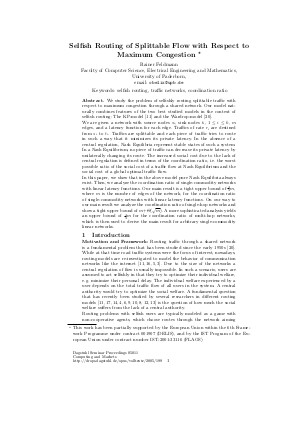Selfish Routing of Splittable Flow with Respect to Maximum Congestion
Author Rainer Feldmann
-
Part of:
Volume:
Dagstuhl Seminar Proceedings, Volume 5011
Part of: Series: Dagstuhl Seminar Proceedings (DagSemProc) - License:
 Creative Commons Attribution 4.0 International license
Creative Commons Attribution 4.0 International license
- Publication Date: 2005-07-19
File

PDF
DagSemProc.05011.15.pdf
- Filesize: 262 kB
- 12 pages
Document Identifiers
Subject Classification
Keywords
- selfish routing
- coordination ratio
Metrics
- Access Statistics
-
Total Accesses (updated on a weekly basis)
0Document
0Metadata
Abstract
We study the problem of selfishly routing
splittable traffic with respect to maximum congestion through a shared
network.
Our model naturally combines features of the two best studied
models in the context of selfish routing: The KP-model \cite{KP99} and the
Wardrop-model \cite{War52}.
We are given a network with source nodes $s_i$, sink
nodes $t_i$, $1 \leq i \leq k$, $m$ edges,
and a latency function for each edge. Traffics of rate
$r_i$ are destined from $s_i$ to $t_i$.
Traffics are splittable and each piece of traffic tries to route in
such a way that it minimizes its private latency.
In the absence of a central regulation, Nash Equilibria represent
stable states of such a system. In a Nash Equilibrium, no
piece of traffic can decrease its private latency by
unilaterally changing its route. The increased social cost due to
the lack of central regulation is defined in terms of the
coordination ratio, i.e. the worst
possible ratio of the social cost of a traffic flow at Nash
Equilibrium and the social cost of a global optimal traffic flow.
In this paper,
we show that in the above model pure Nash Equilibria always exist.
Then, we analyze the coordination ratio of single-commodity networks with
linear latency functions.
Our main result is a tight upper bound of $\frac{4}{3} m$, where $m$
is the number of edges of the network, for the coordination ratio of
single-commodity networks with linear latency functions.
On our way to our main result we analyze the coordination ratio of
single-hop networks and show a tight upper bound of
$m+\Theta(\sqrt{m})$. A more sophisticated analysis yields an upper
bound of $\frac{4}{3}m$ for the coordination ratio of multi-hop networks,
which is then used to derive the main result for arbitrary
single-commodity linear networks.
Cite As Get BibTex
Rainer Feldmann. Selfish Routing of Splittable Flow with Respect to Maximum Congestion. In Computing and Markets. Dagstuhl Seminar Proceedings, Volume 5011, pp. 1-12, Schloss Dagstuhl – Leibniz-Zentrum für Informatik (2005)
https://doi.org/10.4230/DagSemProc.05011.15
BibTex
@InProceedings{feldmann:DagSemProc.05011.15,
author = {Feldmann, Rainer},
title = {{Selfish Routing of Splittable Flow with Respect to Maximum Congestion}},
booktitle = {Computing and Markets},
pages = {1--12},
series = {Dagstuhl Seminar Proceedings (DagSemProc)},
ISSN = {1862-4405},
year = {2005},
volume = {5011},
editor = {Daniel Lehmann and Rudolf M\"{u}ller and Tuomas Sandholm},
publisher = {Schloss Dagstuhl -- Leibniz-Zentrum f{\"u}r Informatik},
address = {Dagstuhl, Germany},
URL = {https://drops.dagstuhl.de/entities/document/10.4230/DagSemProc.05011.15},
URN = {urn:nbn:de:0030-drops-1991},
doi = {10.4230/DagSemProc.05011.15},
annote = {Keywords: selfish routing , coordination ratio}
}
